 Melissa Anderson
Melissa Anderson
Hail dildo, full of grace: Paul Verhoeven gets himself to a nunnery.
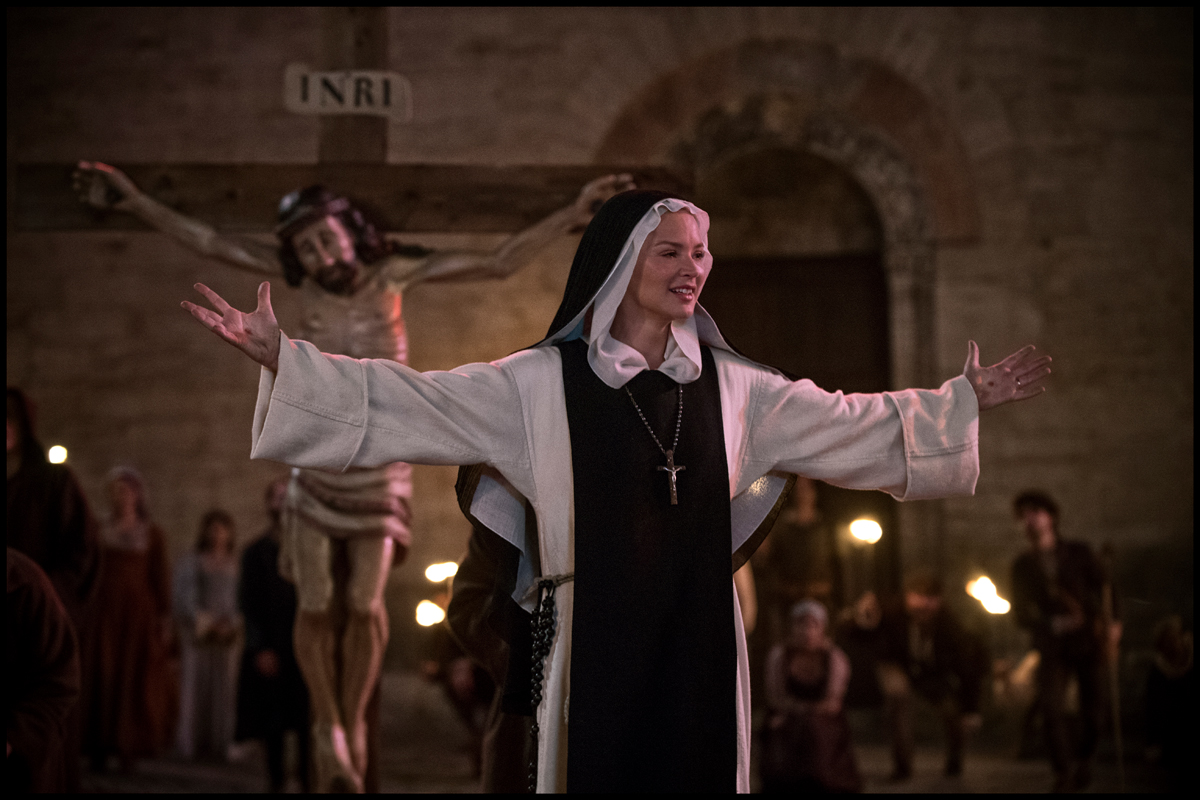
Virginie Efira as Benedetta in Benedetta. Courtesy IFC Films.
Benedetta, directed by Paul Verhoeven, now playing in theaters
• • •
Perhaps what’s most shocking about Benedetta, the latest by the vulgar genius Paul Verhoeven, is the fact that he didn’t make the film earlier. The movie adapts Immodest Acts: The Life of a Lesbian Nun in Renaissance Italy, Judith C. Brown’s 1986 biography of Sister Benedetta Carlini, whose life epitomizes the Dutch provocateur’s most abiding theme—sex and power.
Earlier Verhoeven films have been dominated by objects (often sharp weapons) that take on talismanic significance: the shiny shears wielded by the sleek beauty-salon owner in The 4th Man (1983), the ice pick brandished by Sharon Stone in Basic Instinct (1992), the wee axe that Isabelle Huppert purchases after she’s been raped in her home in Elle (2016). Benedetta continues that trend, though its signature item—a wooden figurine of the Virgin Mary lovingly whittled into a dildo—is an instrument of pleasure, not pain. The artisanal sex toy is just one of many outré elements in a film that abounds with the outlandish: mystic visions, CGI snakes, demonic voices, plague deaths, aborted auto-da-fé, Charlotte Rampling in a wimple. A lot but not quite enough, Benedetta has the odd distinction of being both OTT and underwhelming.
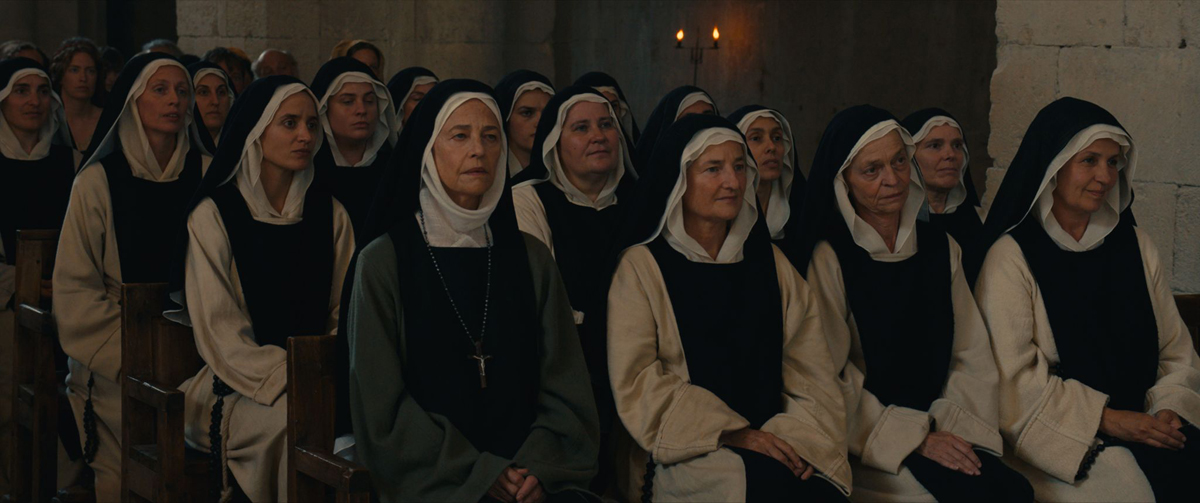
Center left: Charlotte Rampling as Sister Felicita, Abbessin, in Benedetta. Courtesy IFC Films.
Set in the Tuscan city of Pescia in the seventeenth century, Verhoeven’s movie quickly establishes the title protagonist’s avowed deep connection with the Mother of God in a prologue. Warding off a band of brigands while traveling with her parents to the Theatine convent where she will become a bride of Christ, a preteen Benedetta (played at this age by Elena Plonka) affirms her Marian bond: “She does all I ask of her.” As proof, a bird shits in the eye of a bandit. (Further showcasing Verhoeven’s obsession with effluvia, a motif that goes all the way back to Turkish Delight from 1973, Benedetta also features a jester setting his farts on fire and a segment devoted to the nunnery’s privy.) During her first night in the holy house, a ten-foot-tall statue of Our Lady falls on the devout child—an accident that would have crushed those without divine protection. Pinned down by the heavy sculpture, young Benedetta instead sucks ravenously at the effigy’s exposed left breast.
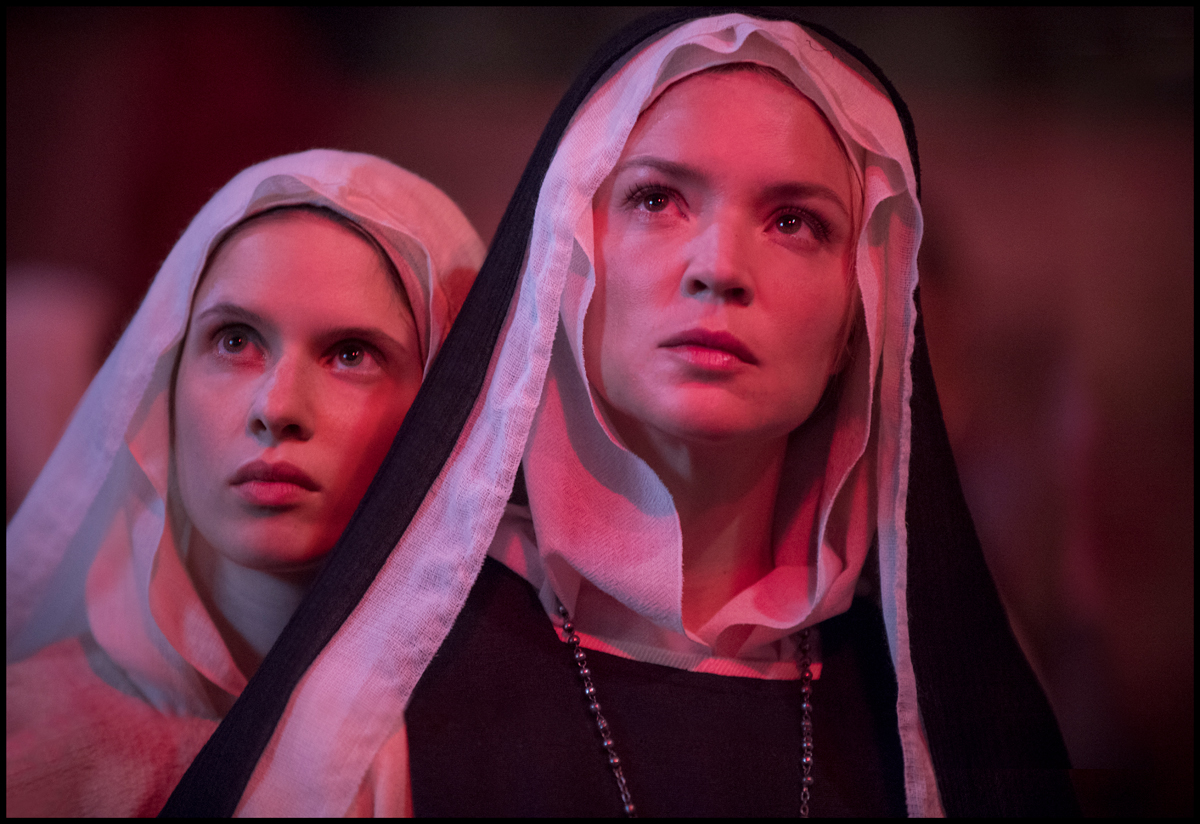
Daphne Patakia as Bartolomea and Virginie Efira as Benedetta in Benedetta. Courtesy IFC Films.
While that incident might suggest that adult Benedetta (Virginie Efira) would be inclined to initiate sexual contact, the opposite proves true. The prophetess turns out to be a pillow princess, reliably brought to howling orgasm by her femme-top lover, Bartolomea (Daphne Patakia), a younger novitiate from wretched circumstances whom the abbess (Rampling) has begrudgingly allowed to enter the convent—for a price, of course. Bartolomea is the DIY genius who repurposes that mini-Mary for X-rated fun (“It will go deeper than my fingers”), carnal activity that a spy in the nunnery reports to the nuncio (Lambert Wilson). Traveling from his gilt palace in Florence, the papal official, whose own amorous life flouts church edicts, arrives at Pescia to accuse Benedetta (and, by association, Bartolomea) of “blasphemy, heresy, and bestiality.”
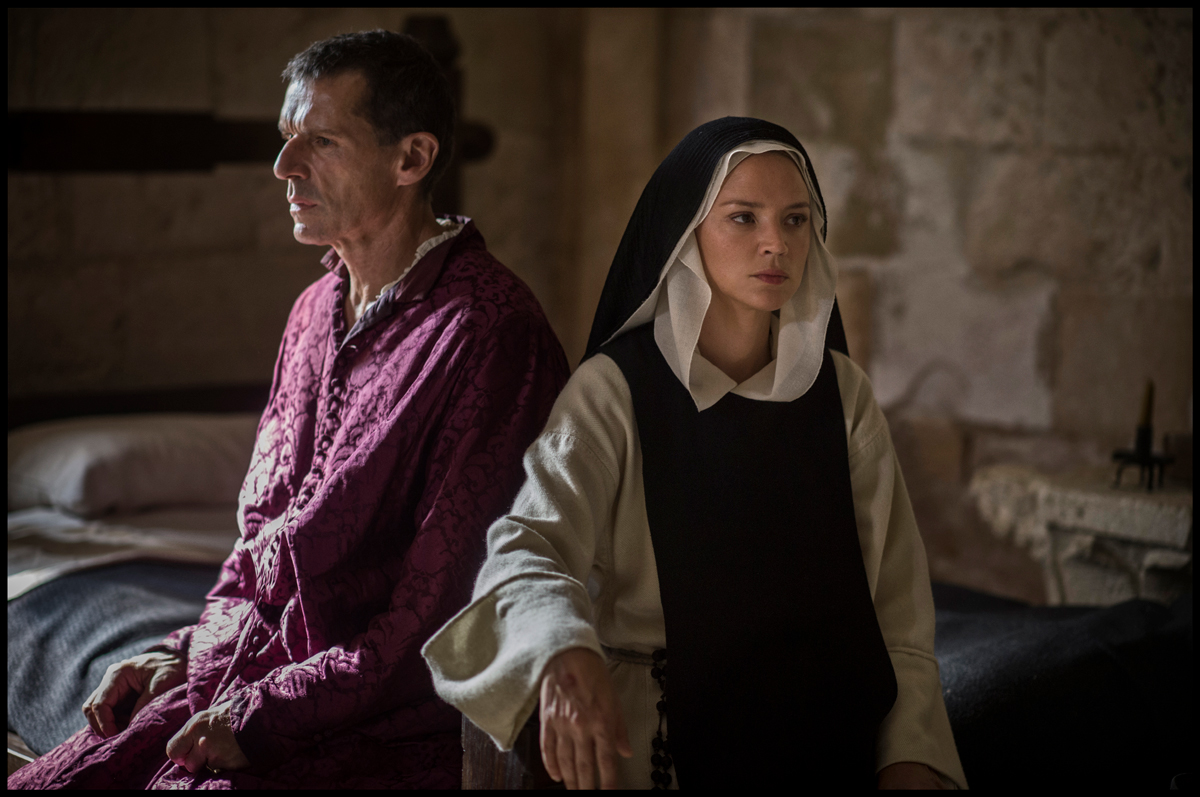
Lambert Wilson as Le Nonce and Virginie Efira as Benedetta in Benedetta. Courtesy IFC Films.
Others have accused Verhoeven and his film of much the same. A Catholic organization calling itself the American Society for the Defense of Tradition, Family and Property, for example, protested Benedetta during its New York Film Festival premiere at Lincoln Center in late September—and returned to the same Upper West Side spot, this time with bagpipes, on December 3, the movie’s opening day. Benedetta isn’t the first succès de scandale from Verhoeven, who’s been outraging the right and the left for decades. (And it’s unlikely the last: among the eighty-three-year-old director’s current projects is a film about Jesus.) Owing to its preponderance of homicidal lipstick lesbians, Basic Instinct, the director’s tawdry riff on Vertigo, invoked the wrath of GLAAD and Queer Nation, which called for protests and boycotts nearly thirty years ago. I must confess that I, a newly out, unbearably self-righteous twentysomething at the time, followed this dubious political strategy. Only much later would I come to appreciate Basic Instinct’s complex sympathies, a hallmark of Verhoeven’s work: in this instance, the fact that no matter how sinister Sharon Stone’s Pacific Heights–dwelling, murderous authoress may be, she remains infinitely more appealing than Michael Douglas’s overweening detective.
In contrast, one disappointment with Benedetta is that, despite its abundance of profane set pieces, it contains few surprises. Even a viewer with the haziest knowledge of Verhoeven’s corpus (or of portrayals of convents since Jacques Rivette’s anti-clerical The Nun from 1966) can be fairly certain that the church hierarchy will be shown as venal and hypocritical. Admittedly, Verhoeven’s film isn’t strictly Manichean. Benedetta could charitably be called a “complex heroine”: not entirely selfless and more than a mere victim of a rank, woman-hating system, she too is power-mad. Proudly displaying her stigmata, Benedetta is venerated by her sisters as a mystic—a status that enables her to supplant Rampling’s character as abbess and to assume her much comfier bed, to Bartolomea’s great delight. But those bloody wounds, the film suggests, were likely self-inflicted from a handy shard of glass rather than divinely rendered.
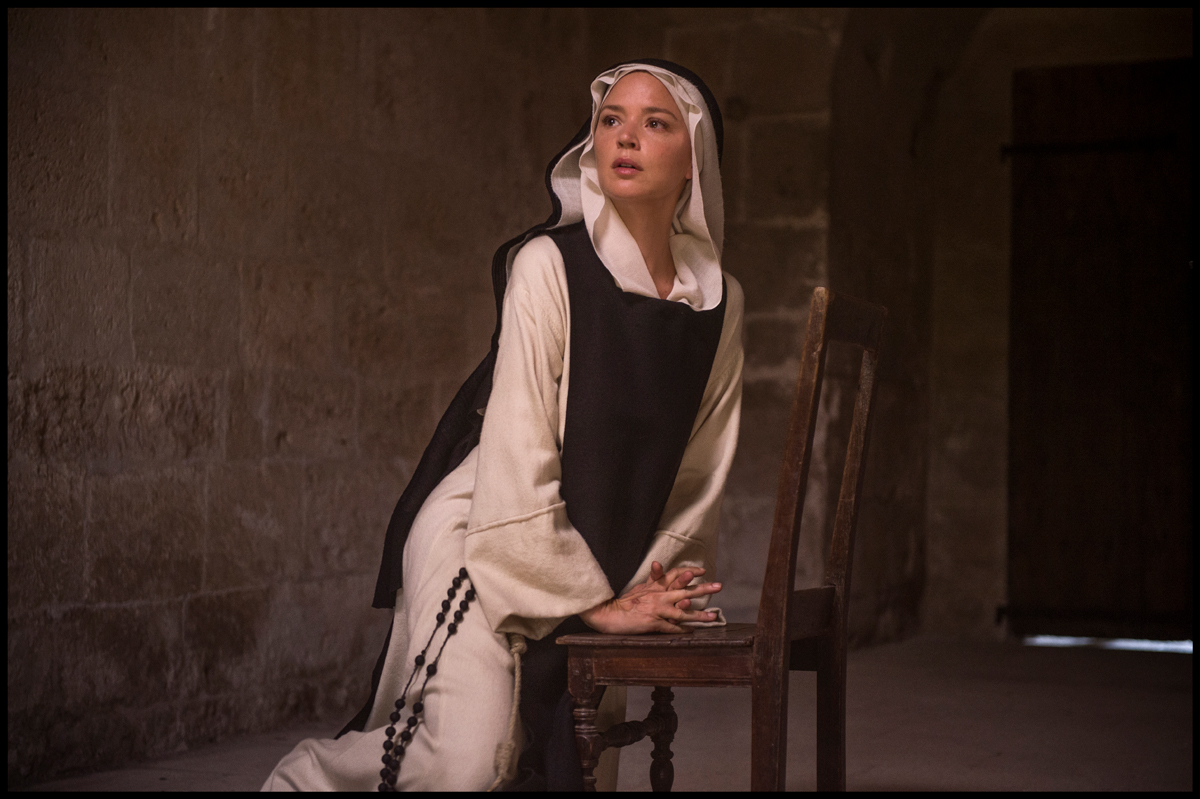
Virginie Efira as Benedetta in Benedetta. Courtesy IFC Films.
While this sapphic nun—whose hallucinatory visions include Christ removing his loincloth to reveal a blank patch of skin where genitals should be—has her appealing eccentricities, she exhibits far fewer of the roiling contradictions and ambiguities that distinguish the female protagonists in Verhoeven’s best films, like Elle (which was scripted, as Benedetta was, by David Birke and features Efira in a supporting role as a pious neighbor). In that constantly bewildering, always absorbing obsidian-black comedy, Huppert plays Michèle Leblanc, a steely CEO of a video-game company. Michèle—and the film—unmoors us from the start: after she’s violated in her luxe Paris digs in Elle’s opening seconds, she calmly sweeps up the debris, draws herself a bubble bath, and calls for takeout sushi (“Qu’est-ce que c’est le ‘holiday roll’?”). After the exécutrice discovers the identity of her assailant, she pursues him, but in highly unexpected ways.
For all of Benedetta’s bizarreries (I’ve neglected to mention the procession of self-flagellators and the graphic depiction of flesh ravaged by buboes), “blasphemies,” and hot lez action, nothing in it quite matches the bracing audacity of Elle or Basic Instinct or several other earlier Verhoeven films. While some zealots may find his latest to be irreligious, for many others, Benedetta simply preaches to the choir.
Melissa Anderson is the film editor of 4Columns. Her book on David Lynch’s Inland Empire is now available from Fireflies Press as part of its Decadent Editions series.